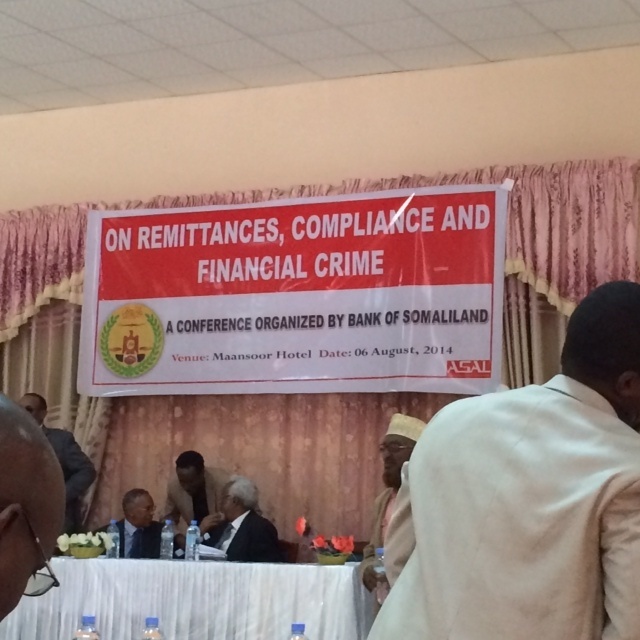New anti-money laundering law in Somaliland may help shore up remittance lifelines
 Bundles of Somaliland's currency are laid out by a money-changer on a street in Hargeisa, capital of the unrecognized breakaway republic of Somaliland in northwestern Somalia. Photo: Kyodo/Landov via NPR http://bit.ly/1vfZHCt
Bundles of Somaliland's currency are laid out by a money-changer on a street in Hargeisa, capital of the unrecognized breakaway republic of Somaliland in northwestern Somalia. Photo: Kyodo/Landov via NPR http://bit.ly/1vfZHCt
Somaliland officials make show of support for financial regulation of money-transfer operators.
Scott Paul is a senior humanitarian policy advisor at Oxfam America.
Imagine this. A full third of the US cabinet takes time out of their schedules to support the adoption of a single law. It’s hard to picture, right?
But that is exactly what happened earlier this month in Hargeisa, when the government of Somaliland presented its draft anti-money laundering law at a ‘Remittances, Compliance and Financial Crime’ conference, which I attended.
Somaliland’s Vice President opened the conference with a keynote speech. The Ministers of Justice, Finance, Interior, Foreign Affairs, Development & Planning, and the Governor and Vice-Governor of the Central Bank each made presentations and attended many of the sessions. That’s a truly amazing show of political will behind the law’s passage and adoption.
“We are not asking for handouts, only the means to own and lead our development.” ~Minister of Foreign Affairs Mohamed Bihi Yonis, in his closing speech on August 11th
That kind of support is heartening, since the law will ultimately be judged on its implementation by the government at least as much as its content. The content of the law, in its draft form, seems fairly standard to my untrained eye. The proposed law makes a significant step toward shoring up the existing remittance system and at the same time moved toward a more stable long-term future.
In the medium-term, strong financial governance will reduce the risks associated with Somali money transfer operators (MTOs) and make them more attractive customers for banks. It will also pave the way for Western-based firms, including banks, to offer services in Somalia – ultimately reducing the country’s total dependence on small MTOs that rely on cooperation with banks and giving Somalis more options for sending money.

Throughout Oxfam’s campaign to save Somalia’s remittance lifeline, we have consistently made the point that the US and UK governments need to work with banks to avoid a scenario where formal closures of channels which members of the Somali diaspora use to send money to their families. This would force many of the 40% of households in Somalia that rely on remittances, and the nation, deeply into crisis. Not only would this mean a devastating economic blow to the entire Somali nation, criminal networks would flourish with money then flowing underground, undermining social relations and destabilizing communities.
So too have we argued that it is up to the regional and national governments in the Somali region, with support from the international community, to develop the sort of financial governance that will ultimately remove the cloud hanging over Somali communities.
No one should expect Somaliland’s banking system to look like America’s, or even Kenya’s, in the next few years. Somaliland’s Central Bank and Finance Ministry are tiny, even by developing country standards, and its government doesn’t fully control the territory it claims as its own. Perhaps the most daunting challenge is that Somali remittance companies are larger, better resourced, and more expert in anti-money laundering controls than the government aiming to police them.
Mohamed Dirie, speaking on behalf of the Somaliland Remittances Association, pledged that the companies will hold themselves to an extremely high standard and pledged their full cooperation with government efforts to regulate them. Given the companies’ interest in setting up a strong anti-money laundering system in Somaliland, the government would be foolish not to ask for their help. Yet doing so potentially compromises the independence of the regime. It’s down to the government to make prudent use of their corporate partners while remaining steadfast in its commitment to police them impartially.
Some will argue that Somaliland’s political status (it claims to be an independent republic but is unrecognized) reduces the importance of the government’s commitment, but they are wrong. Whether as a national or regional government, the authorities in Hargeisa control most of Somaliland, and the authorities in Mogadishu control none. This means that it is Hargeisa’s policy – not Mogadishu’s – that will determine whether banking flourishes or languishes in Somaliland.
Just as importantly, the Somaliland government has made clear that preventing money laundering and saving the remittance lifeline are common interests for all governments – national and regional – in the Somali territories. If Somaliland is able to successfully create a legal culture of anti-money laundering compliance, governments throughout the region may follow its example.
If that happens, Somali people all over the world may be able to breathe a deeper sigh of relief.